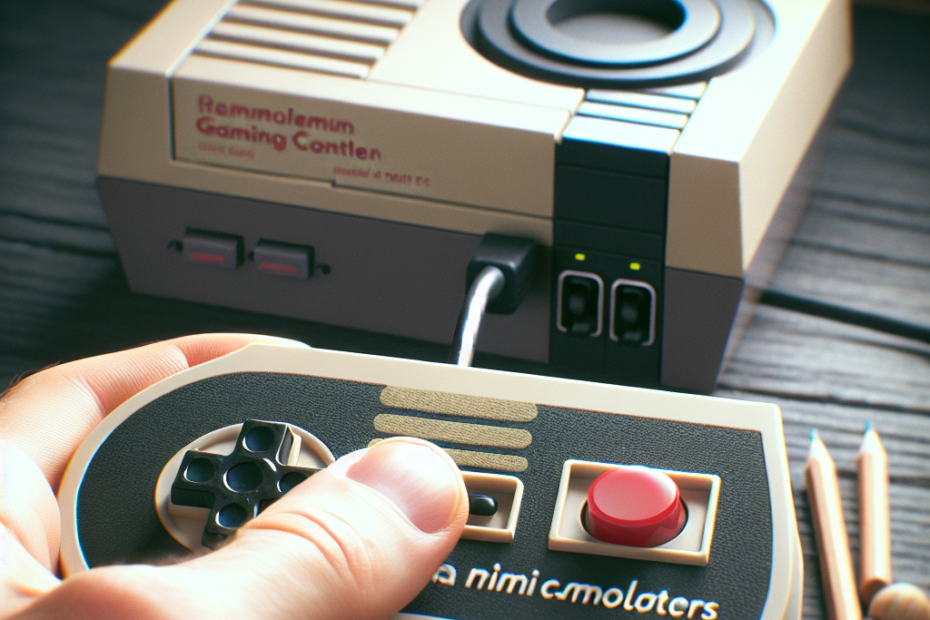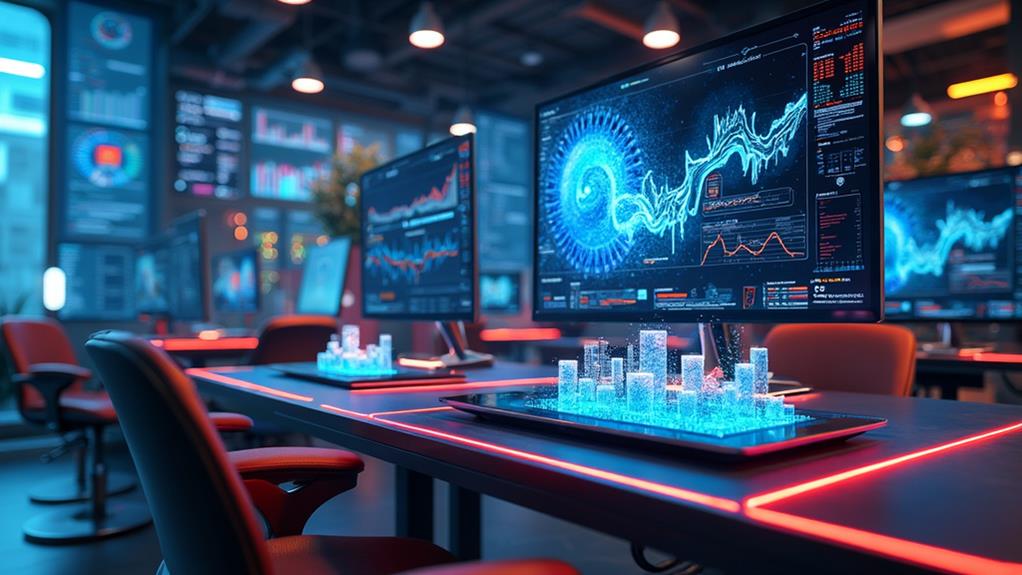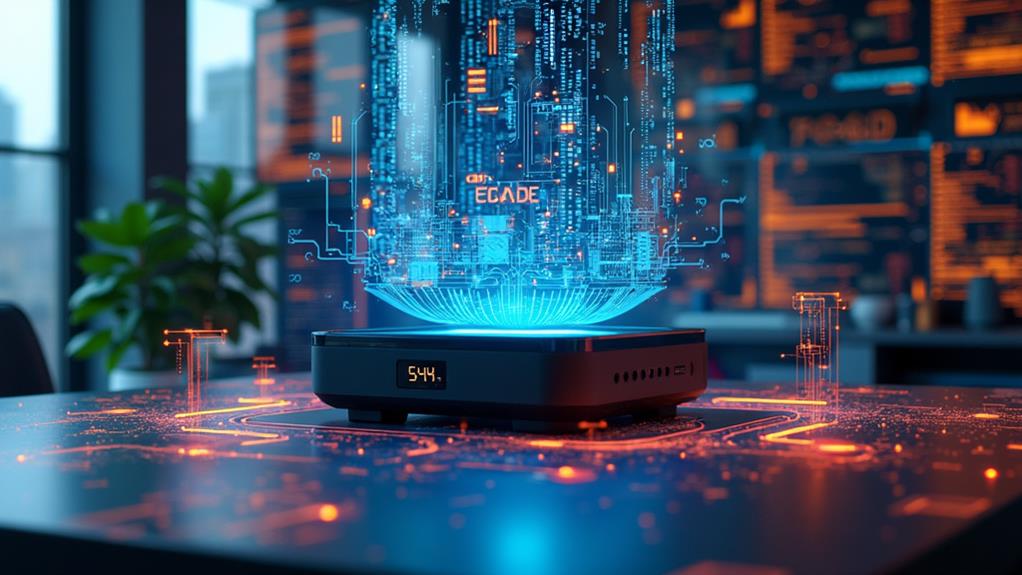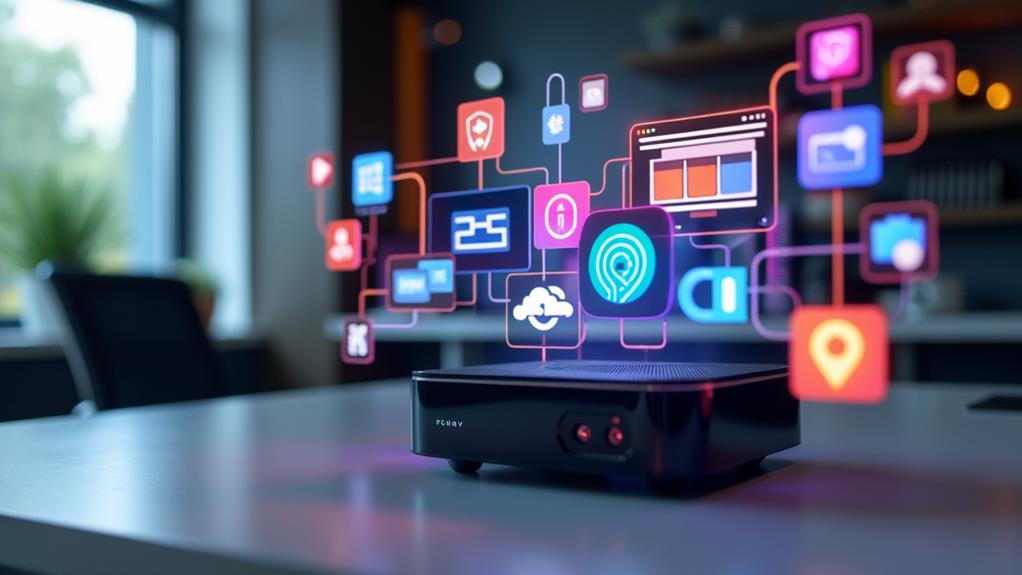



Hey there! Ever wondered if you can run emulators on a mini PC? Well, the answer might surprise you! Emulators have become a popular way for gamers to relive their favorite childhood memories by playing classic games on modern devices. But can those compact mini PCs handle the demands of running these emulators? Don’t worry, we’re here to tell you all about it. So, grab a cup of coffee and let’s dive into the world of mini PCs and emulators!
Understanding Emulators
What Are Emulators?
Emulators are software applications that allow you to mimic the behavior of a particular gaming console or operating system on a different device. In simpler terms, they replicate the hardware and software of a gaming console or computer system, allowing you to run games or applications designed for that system on a different platform. Emulators essentially bridge the gap between different devices, enabling you to play retro games or use software that would otherwise be incompatible with your current device.
How Do Emulators Work?
Emulators work by simulating the internal hardware and software processes of the original gaming console or operating system. They create a virtual environment that duplicates the functions and behaviors of the original system, allowing you to run games or software as if you were using the actual console or computer. This is achieved through reverse-engineering and understanding the underlying architecture, instruction set, and dependencies of the targeted system. Emulators use the host device’s processing power and resources to recreate the desired environment, translating the instructions meant for the original system into ones that the host system can understand and execute.
Why Use Emulators?
There are several reasons why people choose to use emulators on their mini PCs.
Firstly, emulators provide a convenient way to play nostalgic games from previous generations. Whether you want to relive the classics from the Atari, Nintendo, or PlayStation era, emulators allow you to experience the games you grew up with, preserving the memories and enjoyment of those unique gaming experiences.
Secondly, emulators offer the flexibility to play games on different platforms. If you own a mini PC but desire to play games designed for consoles like the Nintendo Switch or PlayStation, emulators allow you to do so without needing to invest in additional gaming hardware. Emulators essentially unlock a vast library of games that were previously exclusive to certain platforms.
Lastly, emulators can be used for software development and testing purposes. Developers often utilize emulators to create, debug, and test applications without the need for physical hardware. This saves time and resources, allowing developers to quickly iterate and fine-tune their software before deploying it to the target platform.
Mini PCs: The Basics
What Is a Mini PC?
A mini PC, also known as a small form factor (SFF) PC, is a compact computer system that typically offers a smaller footprint and lower power consumption compared to traditional desktop computers. These miniaturized devices pack a surprising amount of computing power into their small enclosures, making them ideal for various applications, including gaming.
Mini PCs come in different form factors, such as small rectangular boxes, puck-shaped devices, or even tiny sticks that can be plugged directly into a display or TV. They are designed to be portable and versatile, making them suitable for gaming, multimedia streaming, productivity tasks, or even as media centers for your living room.
Specifications and Capabilities
Despite their small size, modern mini PCs can feature impressive specifications and capabilities. They are equipped with powerful processors, graphics cards, and RAM to handle demanding tasks, including graphics-intensive games. These machines often offer a range of connectivity options, such as HDMI ports, USB ports, audio jacks, and sometimes even Ethernet ports for a wired network connection.
Mini PCs typically run on popular operating systems like Windows or Linux, providing a familiar user interface and compatibility with a wide range of software applications. Depending on the specific model, some mini PCs may also support Wi-Fi and Bluetooth connectivity, enabling wireless gaming and peripheral connections.
Advantages of Mini PCs
There are several advantages to using mini PCs for emulation and gaming purposes. Firstly, their compact size makes them highly portable, allowing you to easily carry your gaming setup wherever you go. Whether you want to play games at a friend’s house or take your mini PC on a vacation, the small form factor ensures that you can enjoy your favorite games without being tied to a bulky desktop computer.
Secondly, mini PCs are often more energy-efficient compared to traditional desktop computers. They consume less power, generate less heat, and produce less noise, making them an excellent choice for those who value a quiet gaming experience or want to minimize their energy consumption.
Additionally, mini PCs are generally more affordable than high-end gaming laptops or desktop rigs. While they may not offer the same level of performance as a top-of-the-line gaming PC, they provide a cost-effective solution for those who want to enjoy retro games or play less demanding titles without breaking the bank.
Compatibility of Emulators and Mini PCs
Operating Systems Supported
Emulators are typically designed to be compatible with various operating systems, ensuring that you can run them on your mini PC regardless of the software environment it runs. The most common operating systems supported by emulators include Windows, Linux, macOS, and Android.
For mini PCs running Windows, you will find a wide range of emulators available, covering consoles from different generations, including NES, SNES, Game Boy, PlayStation, and more. Similarly, Linux users can also access numerous open-source emulators that cater to their gaming needs.
It’s worth noting that Android-based mini PCs, such as those running Android TV or Android-x86, offer an extensive selection of emulators directly through the Google Play Store. This makes it incredibly convenient to download and install emulators on these devices while also providing access to a wide range of retro games and apps.
Hardware Requirements
Emulators have varying hardware requirements depending on the specific systems they emulate. More complex consoles or computer architectures may require more processing power and resources from your mini PC to run smoothly. However, most modern mini PCs can handle emulators for older consoles without any issues.
To ensure optimal performance, it’s recommended to have a mini PC with a capable processor (such as an Intel Core i5 or equivalent), sufficient RAM (8GB or more), and a dedicated graphics card (preferably with DirectX 11 support). These hardware specifications will allow you to run emulators for a wide range of retro consoles without experiencing significant slowdowns or graphical glitches.
Performance Considerations
While mini PCs have become increasingly powerful, it’s essential to manage your performance expectations when using emulators. The performance of emulators is highly dependent on the complexity of the system being emulated, with newer consoles or computers requiring more processing power to achieve smooth gameplay.
Furthermore, the quality of emulation can also vary depending on the specific emulator and the stability of the software. Some emulators may have better compatibility or performance optimization for certain titles, while others may experience occasional glitches or bugs.
When using emulators on your mini PC, you may need to experiment with different settings and configurations to find the right balance between performance, graphical fidelity, and compatibility. It’s essential to note that not every game may run flawlessly on every emulator, so some trial and error may be needed to achieve the best gaming experience.
Popular Emulators for Mini PCs
Dolphin Emulator
The Dolphin Emulator is one of the most well-known and widely used emulators, specifically designed to emulate the Nintendo GameCube and Wii consoles. It offers excellent compatibility and is capable of running games from these platforms with remarkable accuracy. Dolphin supports a variety of features, including high-definition rendering, anti-aliasing, and various enhancements to improve the visual fidelity of games. It also supports game controllers, allowing you to play games using a gamepad for a more authentic experience.
RetroArch
RetroArch is a powerful, all-in-one emulator that supports a vast range of consoles and systems, making it a favorite among enthusiasts and retro gaming communities. It features a user-friendly interface and a customizable menu system, allowing you to organize and access your games easily. RetroArch also supports numerous advanced features such as shaders, netplay, and rewind functionality, enabling you to tweak and enhance your gaming experience to your liking. With RetroArch, you can enjoy games from consoles like NES, SNES, PlayStation, Sega Genesis, and more, all within a single, unified emulator.
ePSXe
ePSXe is a popular emulator specifically designed for the Sony PlayStation console. It provides excellent compatibility and accuracy, allowing you to play a vast library of PlayStation games on your mini PC. ePSXe offers features such as customizable controllers, multiplayer support, and the ability to save and load game states. It also supports game enhancement features like high-resolution rendering and texture smoothing, providing a more visually appealing experience for PlayStation gaming enthusiasts.
PCSX2
If you’re particularly interested in emulating the PlayStation 2, then PCSX2 is the go-to emulator for you. It is a powerful emulator that can accurately replicate the functionality of the PS2 console, allowing you to play your favorite PS2 games on your mini PC. PCSX2 supports various improvements, such as upscaling textures, adding anti-aliasing, and adjusting graphical settings to enhance the visual quality of the games. It also provides extensive configuration options for audio, controls, and emulation settings, ensuring you have full control over your gaming experience.
MAME
MAME, short for Multiple Arcade Machine Emulator, is dedicated to preserving the retro gaming experience of arcade machines. It emulates a vast library of arcade games from various manufacturers and eras, allowing you to relive the nostalgia of classic arcade titles on your mini PC. MAME supports precise emulation of the original hardware and is regularly updated with improvements and bug fixes to ensure accurate gameplay. It also includes features like high-resolution rendering, customizable controls, and support for popular gamepad controllers, giving you an authentic arcade gaming experience.
Setting Up Emulators on Mini PCs
Downloading and Installing Emulators
Setting up emulators on your mini PC is relatively straightforward. Begin by identifying the emulators suitable for the consoles or operating systems you wish to emulate. Visit the official websites or trusted sources to download the installation files for the emulators you need. Ensure that you download the latest stable release or recommended version to ensure the best compatibility and performance.
Once you have downloaded the emulator files, locate the installation package and run the setup program. Follow the on-screen instructions to complete the installation process. Some emulators may require additional dependencies, such as BIOS files or specific libraries, in order to function correctly. Make sure to read the documentation or instructions provided by the emulator developers to ensure you have all the necessary components installed.
Configuring Emulators
After installing the emulators, you will need to configure them to optimize performance and customize your gaming experience. Emulator settings can vary between different software, but common configuration options include graphics settings, audio settings, controller configurations, and general emulation options.
Graphics settings allow you to adjust the rendering resolution, enable graphical enhancements, and tweak various performance settings to ensure smooth gameplay. Audio settings control the output and quality of in-game sounds, allowing you to adjust volume levels and audio effects according to your preferences.
Controller configurations are crucial for emulating the console gaming experience. Most emulators allow you to map your physical gamepad or controller to emulate the original console’s button layout. This ensures compatibility and a seamless transition between the actual console and the emulation.
Lastly, general emulation options may include settings related to save states, screen filters, cheat codes, and other advanced features. Familiarize yourself with the available options and experiment with different settings to find the optimal configuration for your games and preferences.
Finding ROMs and ISOs
To play games on emulators, you will need to acquire the game files, often referred to as ROMs for consoles or ISOs for CDs. These files contain the data from the original game cartridges or discs and are required for the emulators to function.
It is essential to note that downloading or distributing copyrighted ROMs or ISOs without the proper authorization is illegal and a violation of intellectual property rights. To comply with the law, you should only use ROMs or ISOs that you personally own and have legally obtained.
There are legitimate ways to acquire ROMs or ISOs, such as purchasing digital copies of games from authorized online marketplaces or ripping your physical game discs using specialized hardware. Once you have legally obtained the game files, you can transfer them to your mini PC and load them into the respective emulators to start playing.
Maximizing Performance and Compatibility
Optimizing Graphics and Audio Settings
To achieve the best gaming experience with emulators on your mini PC, it’s essential to optimize graphics and audio settings based on the capabilities of your hardware and personal preferences. Start by adjusting the rendering resolution to match your display’s native resolution for the sharpest visuals. If your mini PC can handle it, you may also consider enabling graphical enhancements such as anti-aliasing or texture filtering for smoother and more visually appealing graphics.
Audio settings can also greatly impact your gaming experience. Experiment with different audio plugins or settings to find the optimal balance between sound quality and performance. Some emulators may offer additional features like surround sound or audio filters to enhance the immersion of your gameplay.
Using Controller Configurations
Using a gamepad or controller for your mini PC emulation setup can significantly enhance the gaming experience. Most emulators allow you to configure your controller inputs to mimic the layout and functions of the original console’s controller. This ensures a familiar and intuitive gameplay experience, especially when playing games originally designed for consoles.
Check the documentation or settings menu of your emulator to configure your controller inputs accurately. You may need to perform a one-time mapping of buttons or axes to set up your controller properly. Once configured, you can enjoy a seamless gaming experience, just as if you were playing on the original console.
Updating Emulators
Emulator developers regularly release updates to improve compatibility, fix bugs, and introduce new features. It’s important to keep your emulators up to date to ensure optimal performance and the smoothest gaming experience.
Check the official websites or forums associated with the emulators you use to stay informed about the latest updates. Many emulators have automatic update features or offer convenient update mechanisms within the application itself. Take advantage of these features to keep your emulators up to date and benefit from the latest enhancements and improvements.
Legal Considerations
Copyright and ROMs
One of the most critical legal considerations when using emulators is to respect copyright laws and intellectual property rights. Emulators themselves are legal tools that allow you to run software on compatible hardware, even if they may replicate the behavior of copyrighted systems.
However, the legality of ROMs and ISOs, the game files required to play on emulators, is a contentious issue. Distributing or downloading copyrighted ROMs or ISOs without the authorization of the copyright holder is considered piracy and a violation of intellectual property rights. This includes downloading games for consoles or computer systems that are no longer in production.
It is essential to comply with copyright laws and only use ROMs or ISOs for games that you personally own or have legally obtained through authorized means. Alternatively, there are legitimate ways to purchase and access digital copies of retro games through official platforms, providing a legal and convenient way to acquire the games you want to play on your emulator.
Abiding by Licensing Restrictions
Certain game publishers or developers may impose specific licensing restrictions or terms of use that affect the use of their games on emulators. It’s important to respect these restrictions and abide by the licensing agreements when using emulators and playing games.
Some developers may explicitly forbid the use of their games on emulators, while others may have specific guidelines or limitations. Familiarize yourself with the terms and conditions associated with the games you intend to play and ensure you comply with any restrictions imposed by the copyright holders.
By respecting licensing restrictions, you contribute to the preservation of intellectual property rights and support the developers and publishers who create the games you enjoy.
Achieving the Best Gaming Experience
Choosing the Right Mini PC
Selecting the right mini PC can greatly impact your gaming experience and overall satisfaction with emulators. Consider the following factors when choosing a mini PC for emulation:
Processing Power: Look for a mini PC with a capable processor that can handle the specific emulation requirements. Processors with higher clock speeds and multiple cores will generally provide better performance for more demanding emulators.
RAM: Ensure that your mini PC has adequate RAM to smoothly run the emulators and handle multiple tasks simultaneously. Having at least 8GB of RAM is recommended for a smooth gaming experience.
Graphics: Depending on the complexity of the systems you wish to emulate, a dedicated graphics card may be beneficial. A graphics card with DirectX 11 support will provide better compatibility and performance, especially for newer consoles or computer systems.
Storage: Consider the storage capacity of the mini PC, as some emulated games can require significant storage space. Additionally, opt for an SSD (Solid State Drive) instead of a traditional hard drive for faster loading times and smoother performance.
External Controllers and Accessories
While mini PCs usually support USB or Bluetooth connections, consider investing in external controllers or accessories to enhance your gaming experience. Gamepads designed for console gaming can provide a more authentic feel when playing console games on emulators. Look for controllers that are compatible with your mini PC’s operating system and have native support in your chosen emulator.
Additionally, consider other accessories such as wireless keyboards, gaming mice, or dedicated arcade-style control panels to further customize your emulation setup. These peripherals can provide added convenience and immersion as you navigate through menus, configure settings, or play different types of games.
Utilizing Overclocking
Overclocking involves increasing the clock speed or voltage of your mini PC’s CPU or GPU to achieve higher performance. While overclocking can provide a noticeable boost in emulation performance, it should be approached with caution. Overclocking can generate more heat and potentially reduce the lifespan of your hardware if not done correctly.
Before attempting to overclock, thoroughly research the specific hardware components of your mini PC and familiarize yourself with the process and associated risks. Follow proper overclocking techniques, ensure sufficient cooling for your system, and gradually increase the clock speeds while carefully monitoring temperatures and stability. It’s recommended to consult specialized forums or guides dedicated to overclocking for more detailed instructions and advice.
Troubleshooting Emulator Issues
Common Problems and Solutions
When using emulators on your mini PC, you may encounter various issues that affect gameplay or performance. Here are some common problems you might encounter and their potential solutions:
Slowdowns or Lag: If you experience slowdowns or lag during gameplay, try closing any unnecessary background applications to free up system resources. Additionally, ensure that your mini PC’s graphics drivers are up to date, as outdated drivers can sometimes cause performance issues.
Audio or Visual Glitches: If you notice audio distortions or visual glitches, try adjusting the emulator’s audio or graphics settings. Lowering the resolution or disabling specific graphical enhancements may improve the performance and resolve any glitches.
Controller Connectivity: If your controller isn’t working correctly or isn’t recognized by the emulator, check the controller settings within the emulator’s options. Ensure that your controller is properly connected and try reconnecting or reconfiguring it if necessary. Using a different USB port or trying a different controller can also help troubleshoot potential connectivity issues.
Updating Drivers and Firmware
To ensure optimal performance and compatibility, it’s important to keep your mini PC’s drivers and firmware up to date. Outdated drivers can lead to compatibility issues or performance problems when using emulators.
Regularly check the official support websites of your mini PC’s manufacturer to download and install the latest drivers for your hardware components, such as graphics cards, network adapters, and audio devices. Similarly, firmware updates may be available for your mini PC itself. These updates can provide bug fixes, stability improvements, and additional features that help optimize your emulation experience.
Forums and Support Communities
If you encounter persistent issues with your emulators or require assistance with specific problems, consider seeking support from forums or dedicated support communities. Emulation enthusiasts and developers often frequent online forums to share their experiences, exchange troubleshooting tips, and provide guidance to fellow users.
Joining these communities can be valuable in terms of getting help with technical issues, discovering new tips and tricks, and staying up to date with the latest developments in the emulation scene. When seeking support, ensure that you provide detailed information about your mini PC, the emulator you’re using, and the specific issue you’re facing. This will help community members diagnose the problem more accurately and provide targeted solutions.
Exploring Alternative Options
Virtual Machines and Emulation Software
In addition to traditional emulators, another option to consider is using virtual machines (VMs) or emulation software. VMs allow you to create a virtualized environment within your mini PC, enabling you to run a different operating system as if it were running directly on the physical hardware. This can be advantageous if you need to run software that requires a specific operating system or if you desire a more comprehensive emulation experience.
Emulation software, on the other hand, can simulate the behavior of an entire computer system, including the operating system and hardware. This offers a higher level of compatibility and flexibility, allowing you to run software designed for specific computer architectures or operating systems on your mini PC.
Both virtual machines and emulation software can provide alternative methods for running games or applications that are otherwise incompatible with your mini PC’s native environment. However, these options may require more advanced technical knowledge and additional setup compared to traditional emulators.
Cloud Gaming Services
Cloud gaming services offer an alternative approach to playing games on your mini PC. Instead of relying on the processing power of your local hardware, cloud gaming services stream games over the internet, allowing you to play them on lower-spec devices.
This eliminates the need for emulators altogether, as the games are run on powerful servers and streamed directly to your mini PC. Cloud gaming services often provide a vast library of games, including both modern and retro titles, expanding your gaming options beyond what can be achieved with traditional emulators.
It’s important to note that cloud gaming services typically require a stable and fast internet connection to ensure smooth gameplay. Additionally, some services may have subscription fees or require you to purchase individual games separately.
Exploring cloud gaming services can be a viable option if you prefer convenience and don’t want to deal with the complexities of emulator setup or hardware limitations. However, it’s worth considering your internet connection quality and any potential costs associated with these services.
Disclosure: As an Amazon Associate, I earn from qualifying purchases.







